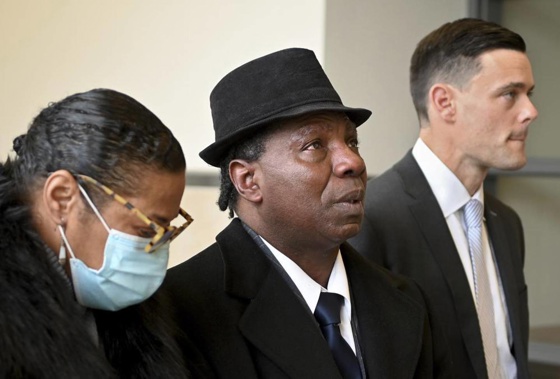
A rape conviction at the centre of a memoir by award-winning author Alice Sebold has been overturned because of what authorities determined were serious flaws with the 1982 prosecution and concerns the wrong man had been sent to jail.
Anthony Broadwater, who spent 16 years in prison, was cleared on Monday by a judge of raping Sebold when she was a student at Syracuse University, an assault she wrote about in her 1999 memoir, Lucky.
Broadwater shook with emotion, sobbing as his head fell into his hands, as the judge in Syracuse vacated his conviction at the request of prosecutors.
"I've been crying tears of joy and relief the last couple of days," Broadwater, 61, told the Associated Press on Tuesday. "I'm so elated, the cold can't even keep me cold."
Onondaga County District Attorney William Fitzpatrick told state Supreme Court Justice Gordon Cuffy at the court hearing that Broadwater's prosecution was an injustice, the Post-Standard of Syracuse reported.
"I'm not going to sully this proceeding by saying, 'I'm sorry.' That doesn't cut it," Fitzpatrick said. "This should never have happened."
Sebold, 58, wrote in Lucky of being raped as a first-year student at Syracuse in May 1981 and then spotting a black man in the street months later that she was sure was her attacker.
Keep up to date with the day's biggest stories
Sign up to our daily curated newsletter for the day's top stories straight to your inbox.
"He was smiling as he approached. He recognised me. It was a stroll in the park to him; he had met an acquaintance on the street," wrote Sebold, who is white. "'Hey, girl', he said. 'Don't I know you from somewhere?'"
She said she didn't respond: "I looked directly at him. Knew his face had been the face over me in the tunnel."
Sebold went to police, but she didn't know the man's name and an initial sweep of the area failed to find him. An officer suggested the man in the street must have been Broadwater, who had supposedly been seen in the area. Sebold gave Broadwater the pseudonym Gregory Madison in her book.
After Broadwater was arrested, though, Sebold failed to identify him in a police lineup, picking a different man as her attacker because "the expression in his eyes told me that if we were alone, if there were no wall between us, he would call me by name and then kill me."
Broadwater was nonetheless tried and convicted in 1982 based largely on two pieces of evidence. On the witness stand, Sebold identified him as her rapist. And an expert said microscopic hair analysis had tied Broadwater to the crime. That type of analysis has since been deemed junk science by the US Department of Justice.
"Sprinkle some junk science onto a faulty identification, and it's the perfect recipe for a wrongful conviction," Broadwater's attorney, David Hammond, told the Post-Standard.
Messages to Sebold seeking comment were sent through her publisher and her literary agency.
Broadwater remained on New York's sex offender registry after finishing his prison term in 1999.
Broadwater, who has worked as a trash hauler and a handyman in the years since his release from prison, told the AP that the rape conviction blighted his job prospects and his relationships with friends and family members.
Even after he married a woman who believed in his innocence, Broadwater never wanted to have children.
"We had a big argument sometimes about kids, and I told her I could never, ever allow kids to come into this world with a stigma on my back," he said.
In addition to Lucky, Sebold is the author of the novels The Lovely Bones and The Almost Moon.
The Lovely Bones, about the rape and murder of a teenage girl, won the American Booksellers Association Book of the Year Award for Adult Fiction in 2003 and was made into a movie starring Saoirse Ronan, Susan Sarandon and Stanley Tucci.
Lucky was also in the process of being filmed, and it was thanks to the film project itself that Broadwater's conviction was overturned after four decades.
Tim Mucciante, who has a production company called Red Badge Films, had signed on as executive producer of the adaptation but became skeptical of Broadwater's guilt when the first draft of the script came out because it differed so much from the book.
"I started poking around and trying to figure out what really happened here," Mucciante told the AP on Tuesday.
Mucciante said that after dropping out of the project this year, he hired a private investigator, who put him in touch with Hammond and Melissa Swartz of the Syracuse-based firm CDH Law.
Hammond and Swartz credited Fitzpatrick for taking a personal interest in the case and understanding that scientific advances have cast doubt on the use of hair analysis, the only type of forensic evidence that was produced at Broadwater's trial to link him to Sebold's rape.
The fate of the film adaptation of Lucky was unclear in light of Broadwater's exoneration.
Sebold wrote in Lucky that when she was informed that she'd picked someone other than the man she'd previously identified as her rapist, she said the two men looked "almost identical".
She wrote that she realised the defence would be that "a panicked white girl saw a black man on the street. He spoke familiarly to her and in her mind she connected this to her rape. She was accusing the wrong man."
Take your Radio, Podcasts and Music with you









